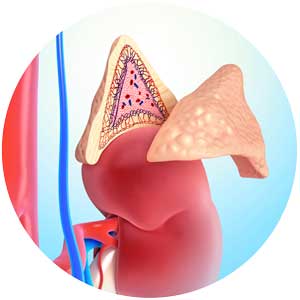FIRST-IN-CLASS PIPELINE
OR-449: A Multifaceted Oncology Drug with Potential for Tumor Agnostic Approval
Adrenocortical carcinoma (ACC) is a formidable disease, affecting approximately 1,500 individuals across the U.S. and Europe. Since the 1970s, when the only FDA-approved treatment emerged, there has been an enormous gap in advancing medical therapies for ACC—until now. OR-449, our lead clinical candidate, has the potential to markedly improve ACC therapy in terms of both safety and efficacy and bring hope to patients with limited treatment options. Looking ahead, Orphagen’s next step is to initiate clinical trials of OR-449.
OR-449 stands at the forefront of innovation in several respects. As a first-in-class, IND-ready oral antagonist targeting the orphan nuclear receptor steroidogenic factor-1 (SF-1 or NR5A1), a tissue-specific transcription factor crucial for adrenal gland development, OR-449 has emerged to take advantage of this strategic target in ACC therapy. OR-449’s unique mode of action leads to inhibition of tumor DNA synthesis through antagonism of SF-1. Unlike previous approaches such as cytotoxic chemotherapy, tyrosine kinase inhibitors, and immunotherapy, which lack adrenal tumor selectivity, OR-449 has both a unique mechanism of action and selectivity for a narrow set of tissues, including the adrenal gland. OR-449’s tissue-targeted approach is supported by robust preclinical cancer model data. Pharmacological studies affirm OR-449’s potency and selectivity for SF-1, underscoring its potential for safety and efficacy.

More about ACC: ACC is an aggressive cancer of the adrenal gland. Surgical removal of an affected adrenal gland is an effective treatment only if the tumor has not metastasized. Once an ACC tumor becomes metastatic, as is the case for most patients, it is difficult to control. Hence, five-year survival rates in both adult and pediatric patients with metastatic disease are low, about 10-20%. In clinical practice, SF-1 is widely used as a marker for ACC, and it is recognized as a potential therapeutic target for both adult and pediatric ACC. SF-1 is commonly amplified at the chromosomal level in pediatric ACC, and SF-1 is recognized as a cell lineage marker in the FDA’s Pediatric Cancer Target List.
Why SF-1 is a promising target for head and neck and lung squamous cancer. SF-1 mRNA and protein are highly elevated in ~10% of head & neck and ~3% of lung squamous cancers. The elevated SF-1 occurs in conjunction with the same, distinct genomic signature in both cancers, further suggesting that the growth and survival of these tumor subsets are dependent on expression of SF-1 and will respond to treatment with OR-449.
For additional information about ACC, patients may contact the following Patient Advocacy Groups:
Let’s Cure ACC Letscureacc.com
ACC Support UK https://accsupport.org.uk/
National Adrenal Disease Foundation (NADF) https://www.nadf.us
Recent publications on OR-449
ENDO 2022 ENDOCRINE SOCIETY ANNUAL CONFERENCE 2022: Characterization of OR-449 action in preclinical models of ACC. Among the key findings—secretion of steroids by ACC tumors grown in mice respond to OR-449, and these same steroids may provide a biomarker of OR-449 engagement with SF-1 in ACC tumors during a clinical trial.
AACR 2022 AMERICAN ASSOCIATION FOR CANCER RESEARCH ANNUAL CONFERENCE 2022: Antagonism of SF-1 as a potential targeted therapy for malignant Leydig cell tumors. Leydig cell tumors and other sex cord-stromal tumors also express a high level of SF-1 (similar to what is observed in ACC). We demonstrate that OR-449 inhibits tumor growth in the rat Leydig tumor cell line R2C.
ENDO 2021 ENDOCRINE SOCIETY ANNUAL CONFERENCE 2021: A Novel Steroidogenic Factor-1 Antagonist, OR-449, as a Targeted Therapy for Adrenocortical Cancer. OR-449 inhibits the proliferation of an ACC patient-derived tumor maintained in immunocompromised mice.
